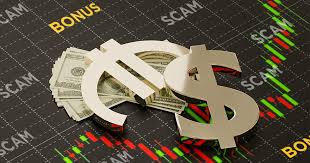Forex Broker Fraud, The world of Forex trading offers immense opportunities for individuals looking to capitalize on fluctuations in global currency markets. However, with these opportunities comes a darker side: Forex broker fraud. This form of financial crime targets traders through dishonest or unethical practices, often leading to significant financial losses. Understanding what Forex broker fraud entails and how to avoid falling victim to it is crucial for anyone looking to engage in Forex trading.
What is Forex Broker Fraud?
Forex broker fraud occurs when a brokerage firm, or an individual posing as one, deceives traders with false promises or manipulative practices. Unlike reputable brokers, fraudulent brokers seek to take advantage of inexperienced traders, manipulate trading conditions, or even disappear with client funds. This type of fraud can manifest in various ways, including fake accounts, misleading claims, platform manipulation, and more.
Common Types of Forex Broker Fraud
- Unregulated Brokers One of the most common forms of Forex fraud comes from brokers operating without proper licenses or regulatory oversight. These brokers often promise high returns with minimal risk but lack any legal framework to protect the client’s money. They may operate in countries with lax financial regulations, making it easy for them to disappear when things go wrong.
- Platform Manipulation Fraudulent brokers may use trading platforms that are intentionally rigged to prevent clients from making profits. This can include false price quotes, delayed order executions, and unexplained slippage, making it nearly impossible for traders to earn a return on their investments.
- Fake Investment Schemes Some Forex broker frauds revolve around Ponzi or pyramid schemes, where returns are paid from the deposits of new investors rather than legitimate trading activity. These brokers lure victims by promising guaranteed profits, only to collapse when they run out of new participants.
- Withdrawal Restrictions A clear red flag of Forex broker fraud is when clients face difficulty withdrawing their funds. Fraudulent brokers may impose unnecessary delays, high fees, or outright refuse withdrawal requests to trap clients’ money in their accounts.
- Signal-Selling Scams Some brokers offer signal services where they sell supposedly profitable trading strategies. However, many of these are based on false or random predictions, leading to inevitable losses for traders who rely on them.
Red Flags to Watch Out For
- Unrealistic Promises Be wary of brokers that guarantee high returns with little to no risk. Forex trading is inherently risky, and no legitimate broker can promise consistent profits without any market volatility.
- Lack of Transparency A trustworthy Forex broker will have clear and accessible information regarding their licensing, regulatory status, fees, and trading conditions. If a broker is vague or reluctant to provide these details, it’s likely a scam.
- Pressure to Deposit Large Sums Fraudulent brokers often push traders to deposit large amounts quickly, promising bonus offers or special deals. However, once the funds are deposited, traders may find it difficult or impossible to access their money.
- Offshore Registration Be cautious of brokers registered in countries with weak financial regulations. Although not all offshore brokers are fraudulent, many scams are based in jurisdictions where there’s minimal legal recourse for defrauded traders.
- Fake Testimonials and Reviews Scam brokers often post glowing reviews and testimonials from supposed clients to build trust. Always verify reviews from independent sources or reputable financial websites rather than relying solely on broker-provided testimonials.
How to Protect Yourself from Forex Broker Fraud
- Choose Regulated Brokers Always opt for brokers that are regulated by a reputable financial authority, such as the U.S. Commodity Futures Trading Commission (CFTC), the Financial Conduct Authority (FCA) in the UK, or the Australian Securities and Investments Commission (ASIC). Regulation ensures that the broker adheres to strict guidelines designed to protect traders.
- Do Your Research Before opening an account with any broker, thoroughly research their background. Look for reviews from trusted sources, check their regulatory status, and ensure they have a solid history of operation. Avoid brokers that have numerous complaints or unresolved issues with clients.
- Start Small When dealing with a new broker, it’s wise to start with a small deposit. This allows you to test the broker’s platform, customer service, and withdrawal process before committing larger sums of money.
- Monitor Your Account Activity Keep a close eye on your trading account and regularly review your transaction history. Be on the lookout for any unauthorized transactions, discrepancies in pricing, or unexplained fees.
- Report Suspicious Activity If you believe you’ve encountered a fraudulent broker, report it immediately to your local financial regulator or law enforcement agency. Taking swift action can help prevent further losses and protect other traders from falling victim to the same scam.
Conclusion
Forex broker fraud is a serious concern in the world of online trading, especially for inexperienced traders who may not recognize the warning signs. By understanding how these scams operate and taking steps to protect yourself, you can minimize the risks and engage in Forex trading with greater confidence. Always choose regulated brokers, conduct thorough research, and remain vigilant to ensure your financial safety.
Forex trading can be lucrative, but it’s essential to stay informed and cautious to avoid becoming a victim of fraud.
You Might Also Like These:
Cyber Recovery Air Gap: A Critical Defense Against Cyber Threats
The Importance of Cyber Security and Disaster Recovery: Designing an Effective Logo
Understanding ICS Cyber Attack Recovery Time: Key Factors and Best Practices

